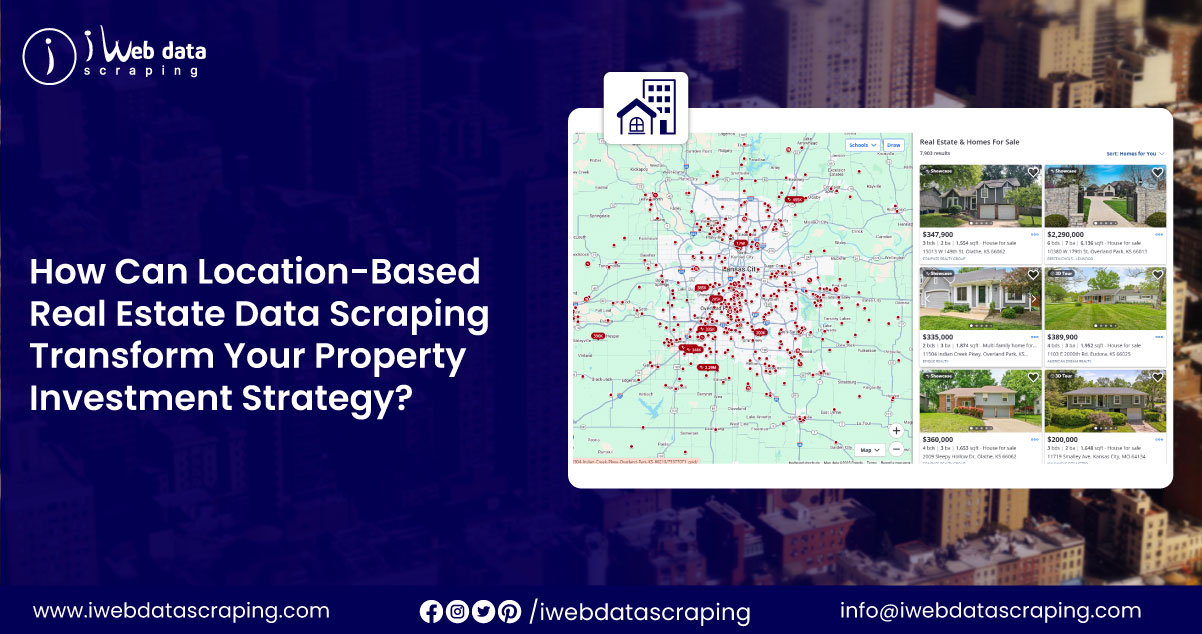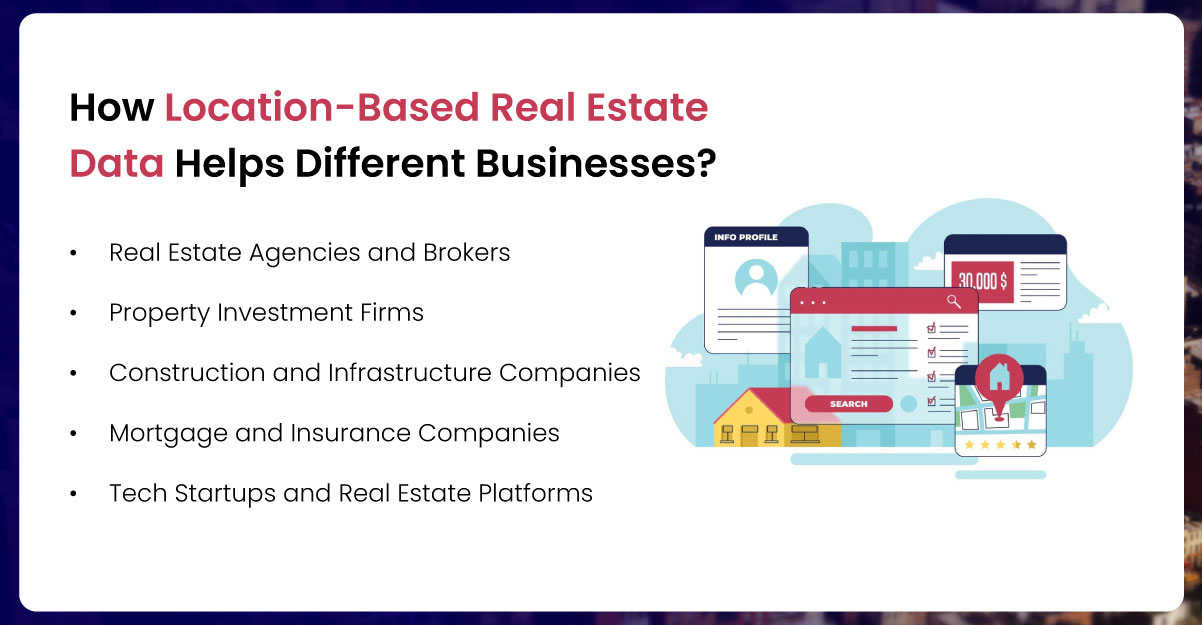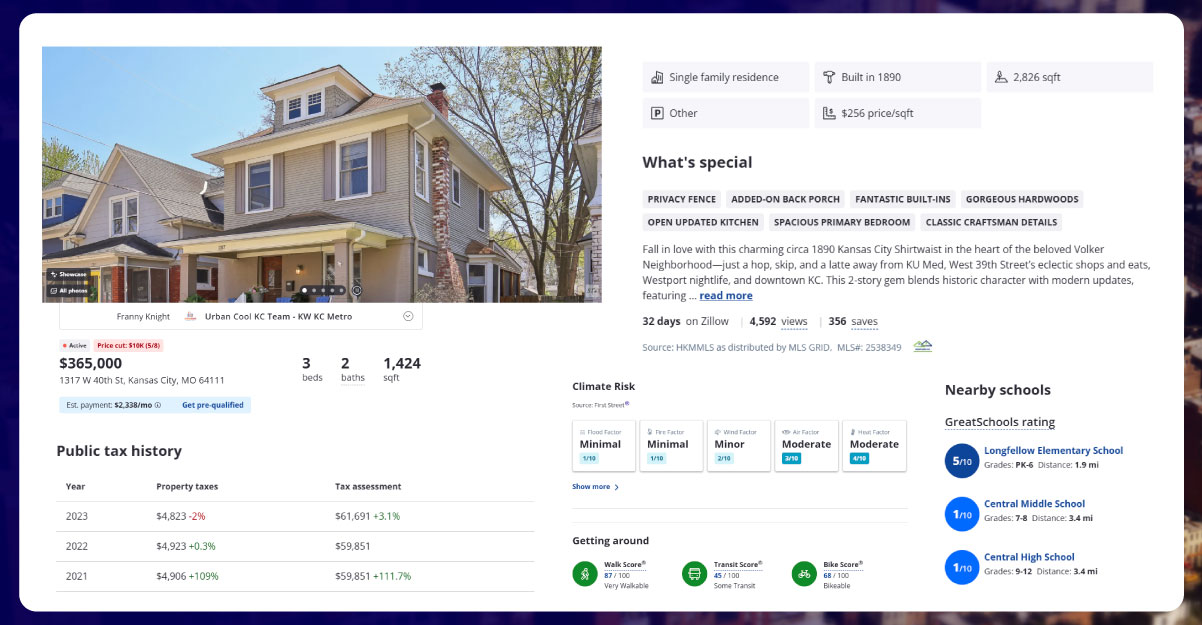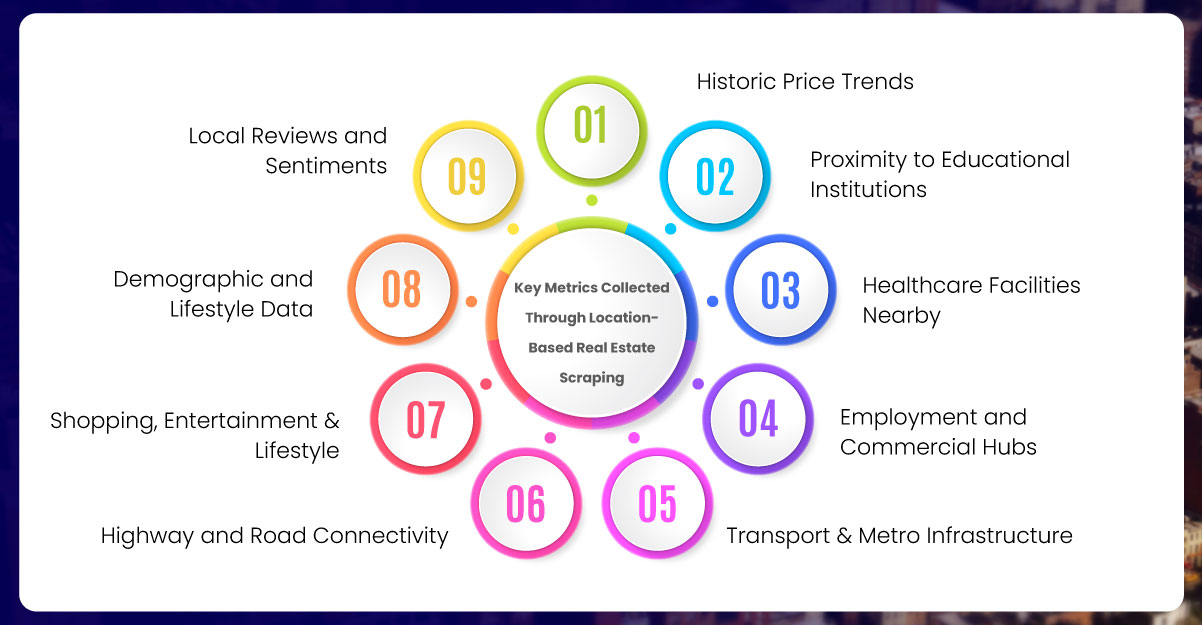How Can Location-Based Real Estate Data Scraping Transform Your Property Investment Strategy?

Introduction
In today's fast-paced, data-driven world, real estate decisions are no longer limited to viewing property listings. Instead, they are powered by deep insights into location-specific factors. Location-Based Real Estate Data Scraping enables businesses, investors, and homebuyers to gain a competitive edge by gathering hyperlocal data that reveals valuable patterns. From analyzing neighborhood development to lifestyle amenities, this method helps build a complete understanding of an area's potential. By using tools to Scrape Real Estate Locality Insights Data, users can explore school zones, healthcare access, transit connectivity, and more. One of the most powerful outcomes is the ability to Extract Historic Property Price Trends by Locality, which helps forecast future value and guide investment strategies. Unlike static listings, this intelligent approach to data extraction delivers actionable insights, enabling smarter, faster, and more confident real estate decisions tailored to the specific characteristics of each neighborhood.
Why Real Estate Data Scraping Is Essential Today?

The real estate market thrives on dynamic information. Traditional data collection methods, such as surveys or public records, are often slow and fragmented. This is where real estate data scraping emerges as a game-changer. By automatically extracting data from real estate portals, public websites, and government databases, businesses can rapidly gather vast volumes of relevant and up-to-date information.
Here's why this is essential in today's context:
- Real-Time Market Analysis: The real estate market is highly dynamic, with property values and buyer demand shifting rapidly based on various factors such as interest rates, local developments, and seasonal trends. Geo-Location Based Real Estate Data Scraping provides the advantage of capturing these changes, offering a live snapshot of the market. This real-time access to updated property listings, price changes, and availability ensures that decision-makers continually operate with the most current information, reducing the risk of outdated analysis and improving responsiveness to market shifts.
- Competitive Intelligence: Staying ahead of the competition is critical in a crowded real estate landscape. By leveraging Real Estate Location Intelligence, agencies and investors can monitor competitor activities across different localities. This includes tracking new listings, price fluctuations, types of properties on offer, and unique selling points. Such intelligence allows businesses to recalibrate their strategies, enhance their offerings, and identify market gaps they can fill, ultimately driving more targeted and profitable operations.
- Portfolio Optimization: Diversification and risk management are key goals for investment firms, real estate trusts, and asset managers. Real Estate Data Scraping Services help stakeholders gather a comprehensive dataset on various regions and property types. This enables them to analyze trends, forecast ROI, and decide whether to acquire, retain, or divest properties. It also allows for more intelligent capital allocation and improved portfolio performance across different geographic zones.
- Urban Development Planning: Municipal authorities, infrastructure companies, and city planners need data to make informed decisions about zoning, public amenities, and community development. Through Real Estate Data Intelligence Services , urban developers can extract critical insights such as population growth, traffic patterns, residential project timelines, and public sentiment. This localized intelligence supports strategic infrastructure planning, ensures better resource allocation, and ultimately helps design smarter, more livable cities.
The Role of Location in Real Estate Data

The classic real estate mantra—"location, location, location"—has evolved in the data era. Today, it's not just about where a property is located, but why that location holds value. With Web Scraping Property Data , buyers, investors, and developers gain in-depth insights beyond basic listings. Location data provides essential context, from neighborhood amenities like schools and hospitals to infrastructure developments like metro access or IT parks. Using rich Real Estate Property Datasets , one can track how an area changes over time, monitor nearby attractions, and compare it with other regions to determine long-term value. This modern approach makes property decisions more informed, data-backed, and aligned with future growth potential.
Unlock the power of data-driven property decisions today—contact us to get started with advanced real estate data scraping!
How Location-Based Real Estate Data Helps Different Businesses?

Location-based real estate data provides valuable insights that help businesses across industries make smarter decisions. From identifying high-traffic retail zones to planning infrastructure projects or selecting ideal office spaces, this data enables organizations to align strategies with local trends, demographics, and development patterns for maximum impact and profitability.
- Real Estate Agencies and Brokers: Location-specific data scraping helps brokers understand hyperlocal trends such as which streets are in high demand or what ZIP codes have seen recent price spikes. This empowers agents to provide highly contextual advice to clients.
- Property Investment Firms: Investors use location-based data to analyze ROI potential across various neighborhoods. They can make better long-term investment decisions by examining past price trends and nearby amenities.
- Construction and Infrastructure Companies: Construction firms can identify high-growth areas by scraping data about new building permits, planned developments, and changes in zoning laws.
- Mortgage and Insurance Companies: Financial institutions can more accurately assess a property's risk and value by scraping data about flood zones, crime statistics, and proximity to hospitals or schools.
- Tech Startups and Real Estate Platforms: Companies building proptech solutions can integrate scraped geolocation-based data to power property recommendation engines, neighborhood scores, and affordability heatmaps.
How Location-Based Data Helps in Choosing the Best Property?

Deciding on the right property is a multifaceted process that goes beyond price or square footage. Location-based real estate scraping helps buyers and renters evaluate properties holistically, with meaningful local insights.
1. Price Trends Over Time Scraping historic pricing data on specific localities helps determine whether a neighborhood appreciates or depreciates. A buyer looking at two similar homes in different areas can weigh one with a rising price trajectory as a better long-term investment.
2. Access to Nearby Attractions and Amenities
The value of a home is often tied to what surrounds it. Scraped data can show:
- Nearby schools and colleges: Important for families with children.
- Healthcare facilities: Proximity to hospitals and clinics affects livability and insurance premiums.
- IT Parks and Workplaces: Helps professionals reduce commute time.
- Recreational attractions: Parks, cinemas, malls, and eateries improve lifestyle quotient.
- Metro Stations and Bus Stops: Enhances public transport access.
- Highway Connectivity: Good road access increases property desirability, especially for suburban areas.
3. Infrastructure Developments Future infrastructure projects like a new airport, flyover, or IT hub can significantly boost real estate value. Scraping location-based news and announcements helps identify such growth corridors early.
4. Crime and Safety Data Scraping local law enforcement websites and news portals for crime statistics helps buyers understand how safe a locality is. This can be a critical factor for families or single professionals.
5. Environmental Conditions Data about pollution levels, noise indexes, or green cover, scraped from local municipal websites or environmental bodies, can influence property choices in urban zones.
Key Metrics Collected Through Location-Based Real Estate Scraping

To enable intelligent real estate decisions, several vital metrics can be extracted from publicly available location-based data sources:
Historic Price Trends
Five-year price appreciation data
Seasonal pricing fluctuations
Rental yield percentages by block or locality
Proximity to Educational Institutions
Distances to top-rated schools and colleges
Catchment area information
Type (public, private, international)
Healthcare Facilities Nearby
Number of hospitals/clinics in a 3-5 km radius
Specialty centers (maternity, trauma, diagnostics)
Emergency response times
Employment and Commercial Hubs
Distance to business districts, IT parks, industrial zones
Job market trends in the region
Commute time via public or private transport
Transport & Metro Infrastructure
Walking distance to metro, rail, or bus stations
Real-time metro expansion project data
Traffic density during peak hours
Highway and Road Connectivity
Access to major expressways or ring roads
Travel time to the airport, CBD, or satellite towns
Scraped GPS data for congestion analysis
Shopping, Entertainment & Lifestyle
Availability of malls, grocery chains, gyms, and theaters
Restaurant ratings and food delivery availability
Cultural or community centers
Demographic and Lifestyle Data
Age groups, income levels, and population density
Cultural or community-specific neighborhoods
Noise, green zones, walkability scores
Local Reviews and Sentiments
Scraped social media and review platforms
Resident opinions about pollution, maintenance, and governance
Tenant satisfaction and neighborhood reputation
Future Outlook: The Power of Predictive Location Intelligence

Location-based scraping is not just about reacting to current data—it's about predicting the future. With machine learning applied to historical datasets, businesses can model price growth trajectories, infrastructure impact forecasts, and livability indexes.
For example:
- Scraping government infrastructure tenders helps estimate future appreciation.
- AI models trained on scraped reviews can flag emerging problems in a neighborhood before they become publicized.
- Analyzing scraped migration data can help anticipate rental demand in particular districts.
How iWeb Data Scraping Can Help You?
- 1. Real-Time Data Access: Our property data scraping provides up-to-the-minute insights, ensuring you always have access to the most current listings, prices, and availability in the market.
- 2. Comprehensive Location Analysis: We gather data not only on properties but also on surrounding amenities, infrastructure, transportation links, and neighborhood trends, giving you a complete picture of any location's potential.
- 3. Customizable Data Extraction: Tailor the scraping process to your specific needs—whether it's historical pricing trends, nearby schools, healthcare facilities, or transit options—enabling more focused, relevant data collection.
- 4. Market Trend Insights: We extract and analyze long-term property trends, helping you identify rising markets, potential investment opportunities, and areas with high growth potential.
- 5. Scalable and Automated: Our scraping services are highly scalable, allowing you to collect property data across various regions without manual intervention, saving you time and resources while enhancing efficiency.
Conclusion
Location-based real estate data scraping is revolutionizing the way property decisions are made. It allows businesses and individuals alike to move from guesswork to informed insight, offering a bird's-eye view of the geographic, economic, and social elements that determine property value and lifestyle fit. Real Estate Data Scraping for Real-time Insights empowers users to analyze current trends, neighborhood dynamics, and competitive landscapes precisely. Whether you're a real estate investor identifying the next hotspot, a buyer searching for a family-friendly neighborhood, or a business targeting urban expansion, the power lies in the data—and more importantly, in how you extract and use it.
Experience top-notch web scraping service and mobile app scraping solutions with iWeb Data
Scraping. Our skilled team excels in extracting various data sets, including retail store locations
and beyond. Connect with us today to learn how our customized services can address your
unique project needs, delivering the highest efficiency and dependability for all your data
requirements.







